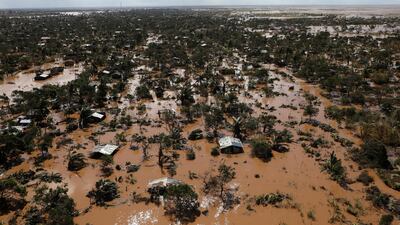At least 15 natural disasters that have occurred this year due to accelerating climate change have caused damage of over $1 billion (Dh3.67bn), a new report revealed on Friday.
Counting the Cost 2019: a year of climate breakdown, released by Christian Aid, looked into 15 of the most destructive droughts, floods, fires, typhoons and cyclones of 2019, each of which caused damage of over $1 billion. All of these disasters were related to climate change, the UK charity said.
Seven of the 15 events cost more than $10bn each, the report found. The most expensive disaster was the damage caused by the California wildfires in October and November, which cost $25bn to control. September and October saw Typhoons Faxai and Hagibis cause more than $20bn of damage in Japan as well as disrupt the Rugby World Cup which was being held there.
May and June were particularly bad times for Asia, seeing $28bn in climate change-caused damage. Cyclone Fani struck India and Bangladesh, parts of China experienced their highest rainfall for 60 years and in Northern India, a stronger than usual monsoon led to floods that killed 1,900 people.
Christian Aid warned that these figures were likely to be underestimates, as in some cases they didn’t take into account uninsured losses and lost productivity.
Along with the floods on the subcontinent, Cyclone Idai, which hit southern Africa, was among the deadliest of these disasters, claiming more than 1,300 lives.
The next major climate change conference is COP26, due to be held in Glasgow in November 2020. The last summit COP25, which was held earlier this month in Madrid, was criticised by environmental activists because they believed too little action was taken by officials after talks dragged on two extra days and no meaningful commitments on the climate were made.
During the conference, officials and NGOs were expected to agree guidelines for carbon markets, but an agreement wasn't reached.
Christian Aid’s climate lead and report co-author, Dr Kat Kramer, said that 2020 was going to be “a huge year” for how the world responds to the climate crisis.
“We have the biggest summit since the Paris agreement was signed five years ago, taking place in Glasgow, where countries must commit to further cut their emissions in line with the 1.5C temperature limit, and boost funding for poor countries suffering from the kind of impacts seen in this report.”
"Last year emissions continued to rise, so it's essential that nations prepare these new and enhanced pledges for action to the Paris agreement as soon as possible. That will ensure the world responds urgently to the warnings of scientists, as well as the demands from school children around the globe who are horrified at the kind of world they are being forced to inherit."
Dr Doreen Stabinsky, professor of global environmental politics at the College of the Atlantic, added: "This report is an important warning about the substantial current economic and human costs of climate change, costs that scientists tell us will just continue to rise unless we stop burning fossil fuels."

